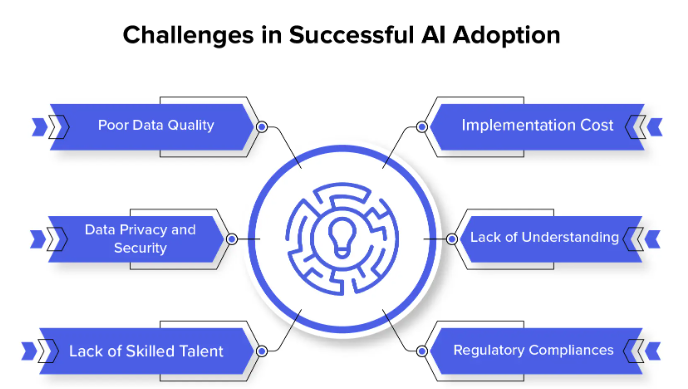In the dynamic realm of technology, AI startups stand at the forefront, pioneering innovations that redefine industries. These ventures are not just tech companies; they are visionaries harnessing artificial intelligence to solve complex problems, create new markets, and offer unprecedented solutions.
However, navigating the AI startup landscape is akin to steering through uncharted waters, filled with immense opportunities and formidable challenges. Success in this space requires more than groundbreaking ideas; it demands a strategic approach to overcoming hurdles such as securing funding, acquiring talent, and developing scalable solutions.
The AI Startup Ecosystem: A Quick Overview
The AI startup ecosystem thrives on innovation, but it's also fraught with obstacles that test the resilience and adaptability of emerging companies. These challenges range from technical issues, like developing robust algorithms and managing vast datasets, to business concerns, such as articulating value propositions and engaging with stakeholders. For AI startups, the journey from concept to commercialization is a marathon, not a sprint. It requires patience, perseverance, and a keen understanding of the technological landscape and market dynamics.
Moreover, the rapid pace of technological advancement means AI startups must continually evolve to stay relevant. Staying ahead with AI UX Research Trend highlights how startups can leverage the latest insights ensuring their solutions address current needs and are adaptable to future demands. The importance of effectively navigating these challenges cannot be overstated. It's the difference between a startup that revolutionizes its industry and one that fades into obscurity.
Dive deeper into the challenges and strategies for success in our article on AI Startups aiming to make a lasting impact. This journey is not just about surviving but thriving by turning challenges into stepping stones to success. For an in-depth exploration of AI's impact across various sectors, visit Harvard Business Review's insights on AI.

Understanding AI Startup Challenges
Lack of In-House Expertise
One significant challenge AI startups face is the lack of in-house AI expertise, a topic further elaborated on in Forbes's article on overcoming AI talent shortages. This gap hinders their ability to innovate and develop AI-driven solutions effectively. For example, a startup aiming to revolutionize healthcare through AI might struggle without the right mix of AI researchers and healthcare experts. To bridge this gap, Startups are turning to strategic hiring, partnerships with academic institutions, and investing in training programs for their existing staff. Discover how an AI Design Agency can accelerate your startup's journey by leveraging expert design strategies. Harvard Business Review offers compelling case studies on how leading AI startups are innovating through strategic partnerships. This approach not only enhances their capabilities but also fosters a culture of continuous learning and innovation.
2. Infrastructure Limitations
AI technologies demand substantial computing power and data storage capacities. Learn from our project SAAS AI-Based Web App where we tackled these very challenges posing a challenge for startups with limited resources. The need for high-performance GPUs and extensive data storage can be a significant barrier to entry. However, many startups are finding cost-effective solutions through cloud computing services, which offer scalable and flexible resources. Leveraging cloud platforms allows startups to access the necessary infrastructure without the upfront cost of physical hardware, enabling them to focus on developing and scaling their solutions.
3. Data Privacy and Security
Our overview of using ChatGPT for Data Analysis provides insights into overcoming data-related hurdles for AI startups, particularly those working with personal information. The challenge lies in ensuring data privacy and security while leveraging data for AI training and operations. Best practices include implementing robust encryption methods, adhering to privacy regulations such as GDPR, and adopting a privacy-by-design approach.
By addressing these challenges head-on, AI startups can lay a solid foundation for their growth and success. The key lies in recognizing these obstacles early and implementing strategic measures to overcome them, whether through leveraging external resources, fostering partnerships, or prioritizing data security and privacy from the start.

Overcoming AI Startup Challenges of Implementation
Identifying AI Integration Areas
Identifying impactful areas for AI integration is crucial, as detailed in TechCrunch's analysis of AI implementation strategies. Success stories often come from startups that strategically implement AI to enhance their core services or products. For instance, an AI startup focusing on customer service may integrate natural language processing (NLP) to automate responses to common inquiries, significantly reducing response times and improving customer satisfaction. Another example is leveraging AI for predictive analytics in supply chain management, optimizing inventory levels based on predictive models. These case studies highlight the importance of targeted AI integration that aligns with business goals and delivers tangible benefits.
2. Intellectual Property Concerns
Intellectual property (IP) is a significant consideration for AI startups, particularly when developing proprietary algorithms or utilizing data from external sources. Navigating the complex landscape of IP rights requires a clear strategy to protect a startup's innovations while respecting the IP of others. Startups can address these concerns by establishing clear agreements on IP ownership in partnerships, investing in patents to protect their innovations, and ensuring compliance with copyright laws when using third-party datasets. Understanding and proactively managing IP rights are essential for securing a startup's value and fostering trust with partners and customers.
3. Resource Allocation
Balancing the budget with the needs of AI development is another major hurdle. AI projects can be resource-intensive, requiring significant investments in talent, technology, and data. Startups must strategically decide where to allocate their limited resources to maximize impact. This often involves prioritizing projects with the highest potential return on investment (ROI), seeking external funding or partnerships to supplement internal resources, and adopting lean development methodologies to iterate quickly and efficiently. Effective resource allocation ensures that startups can sustain their AI development efforts while scaling their operations.
Overcoming these implementation hurdles requires a combination of strategic planning, judicious resource management, and a deep understanding of the legal and operational landscape of AI technology. By focusing on these areas, AI startups can navigate the complexities of bringing innovative solutions to the market and achieve sustainable growth.
Navigating the Market and Competition
Differentiating in a Crowded Space:
To stand out in the AI field, blending innovation with strategic positioning is essential, as discussed in MIT Technology Review's piece on AI market differentiation. of your unique value proposition. Startups can distinguish themselves by specializing in niche markets, developing proprietary technology, or offering superior customer experiences. Tailoring solutions to specific industry challenges or delivering personalized user experiences can also set a startup apart. Successful differentiation hinges on understanding customer needs deeply and showcasing how your AI solutions offer distinct advantages over competitors.
2. Customer Acquisition and Retention
Leveraging AI to enhance customer experiences is a powerful strategy for both acquiring new customers and retaining existing ones. AI can provide personalized recommendations, automate customer service through chatbots, and optimize user interfaces for better engagement. By utilizing AI to analyze customer behavior and preferences, startups can deliver more relevant content and services, increasing customer satisfaction and loyalty. Building a customer-centric AI strategy ensures that startups not only attract but also maintain a strong, engaged user base.
3. Keeping Up with AI Advancements
The AI landscape is evolving at an unprecedented pace, making it crucial for startups to stay informed about the latest technologies and methodologies. Continuous learning, attending industry conferences, and engaging with the AI research community can help startups remain at the cutting edge. Additionally, adopting agile development practices allows startups to quickly iterate on their products based on new advancements and customer feedback. Staying ahead requires a proactive approach to innovation, a commitment to ongoing learning, and the flexibility to adapt to new trends and technologies.
By focusing on these strategic areas, AI startups can navigate the complexities of the market and competition, carving out a successful niche in the bustling AI ecosystem. Success in this space demands more than just technical excellence; it requires a deep understanding of market dynamics, a customer-first approach, and the agility to adapt to an ever-changing technological landscape.

3 Case Studies: Success Stories and Lessons Learned
In the world of AI startups, numerous success stories illuminate the path for emerging companies. By examining these cases, we can distill key lessons and actionable insights for overcoming challenges and achieving success.
Startup A: Overcoming Data Accessibility Challenges
Startup A's journey in AI-driven healthcare solutions and dataset challenges is mirrored in Nature's report on AI in healthcare. By forming strategic partnerships with healthcare institutions and leveraging anonymized patient data, they developed predictive models that significantly improved patient outcomes. The key takeaway here is the importance of building strong partnerships to overcome data accessibility challenges.
Startup B: Navigating Funding and Scaling
Startup B, a pioneer in AI-based educational technology, initially struggled with securing funding and scaling its solution. They overcame these challenges through a combination of bootstrapping, crowdfunding, and eventually attracting venture capital by demonstrating strong user growth and engagement. This case underscores the value of proving your product's market fit and scalability to secure funding.
Startup C: Intellectual Property and Market Differentiation
Startup C developed a unique AI algorithm for personalized content delivery. They faced challenges in protecting their intellectual property and differentiating themselves in a competitive market. By securing patents for their core technology and focusing on a niche market segment, they established a strong market position. This example highlights the importance of protecting intellectual property and finding a niche market for differentiation.

AI Startup Challenges: 5 Lessons and Actionable Insights
Partnerships Are Key: Effective collaborations can open doors to critical resources and expertise, streamlining the path to innovation and market entry. They enable startups to leverage existing infrastructures, data pools, and funding channels, reducing the initial burden of resource acquisition.
Prove Your Value: Establishing a clear product-market fit and demonstrating scalability is essential for attracting investors. This involves rigorous market research, customer feedback, and adapting your product to meet identified needs effectively.
Protect Your Innovations: Intellectual property protection is not just a legal formality; it's a strategic asset. Patents, trademarks, and copyrights can safeguard your innovations, deter competition, and enhance your valuation in the eyes of investors and partners.
Focus on Niche Markets: Specializing in a niche market allows for more targeted solutions, personalized customer experiences, and less direct competition. This focus can lead to higher customer loyalty and brand strength, providing a solid foundation for growth.
Embrace Agility and Innovation: In the fast-paced AI sector, the ability to rapidly pivot and innovate in response to market changes is crucial. Startups that maintain agile development practices and foster a culture of continuous innovation can more effectively meet evolving customer needs and stay ahead of the competition.
These insights emphasize the importance of strategic planning, market understanding, legal protection, and targeted marketing in navigating the complex AI startup ecosystem. These case studies also offer valuable insights for AI startups navigating the complex landscape of innovation, funding, and market competition. By learning from these success stories, startups can develop strategies to tackle their unique challenges and carve out their own success stories.
Conclusion
Navigating AI startup challenges involves developing strategic expertise, investing in sound infrastructure investments, and prioritizing data privacy. Allocating resources efficiently and protecting intellectual property are also integral parts of succeeding in the AI landscape.
By focusing on core competencies and partnerships AI startups can unlock success quickly while making meaningful advancements across industries. For deeper insights. Unlock strategies for AI Development and Innovation with AI startup Challenges and learn about The Rise of generative AI Startup




